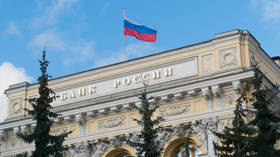EU states ‘extremely cautious’ over Russian assets seizure – FT

Not all EU members are in favor of seizing frozen Russian assets and using them to fund Ukraine, the Financial Times reported on Wednesday. The initiative is gaining traction among the G7 states, as the US and EU have failed to secure a new financial aid package for Kiev, the newspaper said.
France, Germany and Italy remain “extremely cautious” about the idea, and some EU officials “fear possible retaliation” from Moscow if its money is seized, according to the article.
About €260 billion ($285 billion) of Moscow's central bank assets were immobilized in G7 countries, the EU and Australia last year, the article said, citing a European Commission document. About €210 billion ($230 billion) of Russia's reserves are held in the EU, including €191 billion in Belgium and €19 billion in France. Switzerland holds about €7.8 billion, followed by the US with $5 billion, it added.
One European official told the FT that the EU has “much more to lose” because, unlike the US, it holds the bulk of Moscow's assets. The article also notes that the seizure of Russian reserves would “cross a line” by showing countries such as China or Saudi Arabia that sovereign assets held in Western currencies may not be safe. Beijing's foreign reserves exceed $3 trillion, according to the State Administration of Foreign Exchange, and Riyadh has over $410 billion, the country's financial portal Argaam reports.
Last week, the FT reported that the US, which “has never publicly supported confiscation,” has privately taken a tougher stance in recent weeks, telling G7 members that there was “a route” to make it “consistent with international law” to seize Moscow's money to fund Ukraine.
The same article quoted a US government document submitted to G7 committees that said the group's members and “other specially affected states” could seize Russian sovereign assets “as a countermeasure to induce Russia to end its aggression.”
Last month, Russian State Duma Speaker Vyacheslav Volodin said the G7's seizure of Russian assets would be “illegal” and would give Moscow “moral and legal grounds” to retaliate against G7 assets, which are “more numerous than Russia's frozen funds.” Kremlin spokesman Dmitry Peskov said that such a move “violates all possible rules,” noting that those who decide to confiscate Russia's reserves will face “serious” judicial and legal consequences.













